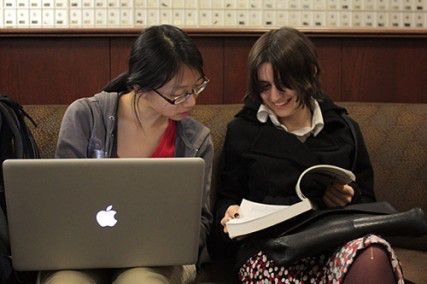
While a new study found group settings are highly conducive to learning, group functionality and organization are dependent on the instructor’s extensive planning, said Boston University’s Educational Media and Technology director David Whittier.
The study, published in the Nature Scientific Reports journal Wednesday, analyzed the interactions between 290 students in a collaborative learning environment and found a student was more likely to score higher in the course if he or she had more online interactions with others.
“There are a lot of things that go into setting up effective group work, and so if teachers and professors are able to do that, then yes, collaborative work groups can be very productive,” Whittier said. “But that’s not always the case — just by setting up a group and putting them online does not mean they’re going to be effective.”
Researchers examined approximately 800,000 student interactions in total, finding a 72-percent correlation between social interaction and the exchange of information, according to the study.
Whittier said professors and teachers must organize learning groups to include students of high ability, middle ability and low ability, thereby providing equal opportunities to learners at all levels.
He also said content must be tailored to group settings.
“To ensure that those groups have some motivation to work together is to arrange the content so that each one has his or her own area of content, so a high-ability learner cannot dominate a group,” he said.
While cooperative learning has existed since the 1930s, online learning plays a significant role in modern group collaboration, Whittier said.
“Now it’s just finding expression on the web, on the Internet, through our phones and tablets and everything, and it’s a trend that has just recently dramatically escalated because of technology,” he said.
Whittier said many teachers and professors are determining how to use technology to their advantage in preparing students for post-collegiate lives.
“It [educational technology] is not a simple thing,” he said. “It’s not a black-and-white thing but certainly the kind of collaboration that’s possible is very much part of our world so it’s certainly going to be part of education.”
A number of students said they enjoy working with other students as an alternative method of learning.
Group work, which allows students to collaborate and bounce ideas off of each other, makes material more interesting, said School of Management sophomore Samantha Moravec.
“It really enhances learning of the material and it’s also more interesting than individualized learning,” she said. “I’ve also had a lot of employers when I’m interviewing for internships harp on the fact that we do a lot of team-focused things here, and they seem to like that.”
Moravec said group work helps her learn material better than if she were to tackle the information on her own.
“It [group learning] also just helps me retain the material a little bit better because I’ve been doing it in a practical setting, as opposed to just reading textbooks and regurgitating facts,” she said. “You get to practice the things you’re learning about.”
Albert Tawil, an SMG junior, said group work in college is beneficial because it is modeled after real-world situations and helps teach students how to communicate effectively, whereas individual learning might not.
“It’s very practical and it teaches you how to deal with people,” he said. “Individual learning is probably the main way that people learn, but it does lack, sometimes, the practical component of actually working on a problem with other people.”
However, group learning can be distracting and could pose problems depending on the participants involved, Tawil said.
“Sometimes you end up spending not enough time not doing work, or spending time with people you don’t really want to spend time with when you can get more work done individually,” he said.
Tawil said modern online learning is used primarily to supplement in-person collaboration, but may be a preview of what education will soon become.
“Online group learning — as the only way of learning — defeats the purpose of group learning, which is being in person and communicating,” Tawil said. “But then again … [online communication] is the way of the future, so maybe it’s preparing people.”
Jessica He, a College of General Studies sophomore, said she prefers working by herself unless she is confident in the other members of her group.
“I mainly prefer to work by myself just because I know what I’m doing and I don’t have to rely on other people,” she said. “But as long as I have a good group, like when I’m doing Capstone, I’m confident that other people will pull their part.”
This is an account occasionally used by the Daily Free Press editors to post archived posts from previous iterations of the site or otherwise for special circumstance publications. See authorship info on the byline at the top of the page.



